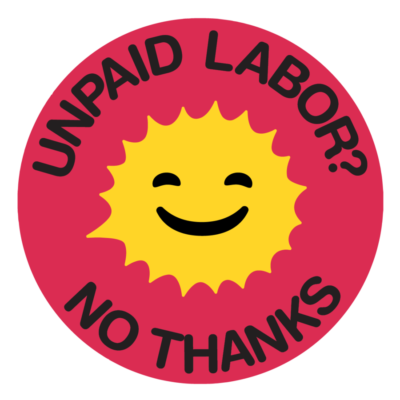 The following was inspired by a quote uttered last week by Fangoria radio co-host Debbie Rochon, a prolific actress who’s appeared in over 150 low budget horror films, of which, in a wistful moment, she had this to say: “I wonder if the day will ever come when anyone actually offers me any money.”
The following was inspired by a quote uttered last week by Fangoria radio co-host Debbie Rochon, a prolific actress who’s appeared in over 150 low budget horror films, of which, in a wistful moment, she had this to say: “I wonder if the day will ever come when anyone actually offers me any money.”
This got me thinking back on my own career in the movie/TV industry—hence the following, which is concerned not with watching and/or critiquing movies, but the brutal, unforgiving job of making them.
The full story of my toils in Hollyweird would take a multi-volume encyclopedia’s worth of verbiage to fully relate, so here I’m going to concentrate on one aspect of the biz that really irks me: the practice of working for free.
Real Life Anecdote #1: The time was the mid-1990s. Having just graduated film school and anxious to find work in the industry, I snagged a job as a “Runner” on an independent film production. It was understood that I’d be working for no money, which I accepted for the same reason most wannabe moviemakers do: I wanted a credit for my resume.
The job wasn’t entirely unpleasant. I drove all over LA and the valley, picking up film stock, dropping off scripts, making copies and even spending time at the LA library, where I did intense research on regions of Africa where the director planned to do a week’s worth of pick-up shots (I came away knowing more about Cameroon and Ghana than probably any other non-African).
All told I put in around 9-10 hours each day (with gas and food costs paid by me). After three weeks my finances were running dangerously low; I had no choice but to break things off and find a real job. The filmmakers didn’t take this too well—how dare I not want to labor on their masterpiece for no pay? In retaliation for such unthinkable insolence they left my name off the credits.
So there you have it: I’d sacrificed three weeks of my life for literally nothing. (Which hasn’t stopped me from listing the film on my resume anyway, and pointing out that its makers’ claim of having filmed “entirely on location in Africa” is horseshit.) A bitter pill to swallow, but at least I learned the fallacy of working for free early on.
Here are some pertinent quotes from writer/troublemaker Harlan Ellison (excerpted from the documentary DREAMS WITH SHARP TEETH), recalling a request by Warner Bros to use his words on a BABYLON 5 DVD. He was naturally asked to do it for free, and claims to have responded thusly (and appropriately): “By what right would you ask me to work for nothing?” On the justification that “everyone else” does so: “Everyone else may be an asshole but I’m not!” On the idea of doing it for “publicity”: “The only value for me is if you put money in my hand!” And finally, on why the studios feel justified in asking for freebies: “There are so goddamn many writers who have no idea that they’re supposed to be paid…you’re undercut by all the amateurs!”
I applaud Ellison for so forcefully speaking out on this topic, although there are a couple points in his harangue I’d dispute. First is his focus on the writer—“Do you pay the cameraman?” he asks, “Do you pay the cutters??” Oftentimes no, those people aren’t paid (I wasn’t the only person working for nothing on the film described above). Believe me, this issue affects the entirety of the industry, not just writers.
The other difference I have is Ellison’s claim that it’s the amateurs who are undercutting those expecting to be paid for their work. The fact is many so-called professionals are just as guilty. Which brings me to…
Real Life Anecdote #2: Back in the late 1990s I was contacted by a friend who’d gotten hired to production manage a big studio financed short film. He requested my help finding crew people, and I agreed, if only because it was something to do aside from faxing out resumes and waiting for the phone to ring.
I recommended several qualified people I knew, all of whom my friend nixed. None, he claimed, had sufficient experience. The film, you see, was being made by a first time writer-director, and the studio wanted only “Hard Core Professionals” on the crew.
It made a kind of sense: this untested auteur was chosen because he allegedly wrote “exactly like Quentin Tarantino.” In this way the studio didn’t have to go out and look for the Next Quentin Tarantino, as they’d be nurturing him themselves by financing a short film to jump start the sure-to-be-auspicious career of this genius-in-training, complete with a professional crew to ensure that he didn’t screw up. The only thing is the studio demanded these seasoned professionals work for NO PAY.
Somehow the desired Hard Core Professionals were found. My production manager friend was present for the shoot (by which point I’d wisely rescinded my services), and later he reported to me how impressed he was by these guys’ experience and professionalism.
I don’t know about that last point. How “professional” could those men really be if they’re willing to offer their time and expertise for free? Don’t these assholes realize that by foregoing payment for their services they’re not just screwing over themselves but the rest of us as well?
By the way, the film under discussion never amounted to much, and nor did the supposed next-big-thing director (who I’ve never heard from since)—I’m so glad those Hard Core Professionals devoted their time to the project. Back then I really wished I could track down those guys and bitch slap ‘em all. I still do.
And the unions? They have a way of looking the other way when the studios, major and otherwise, abuse their workers. Every few years there’s an outcry over long working hours on film sets (begun in 1997, when a crewmember coming off an all-nighter on the set of PLEASANTVILLE fell asleep while driving and died in a car crash). Long hours have always been a staple of the industry, despite the noise made by the guilds and unions.
On the issue of working for free, however, those same guilds and unions tend to make little-to-no noise, as the following attests.
Real Life Anecdote #3: For a few weeks in late ’96 I got a job as a production assistant on the lot of a major studio. I was situated in the writers’ trailer of a cheesy sitcom for what were very likely the most unpleasant weeks of my life (production assistant means, in essence, the guy who does the shittiest errands and gets blamed for everything—and I do mean everything). I was paid, however, so it wasn’t a total loss.
The point of this anecdote is a troubling fact I learned on the job that held true for this particular studio and several others: they only paid their employees for 15 hours of work. That doesn’t mean the workers were dismissed after 15 hours, just that payment stopped after that amount of time had elapsed. Luckily I was laid off before ever having to work any 15-hour-plus days, which apparently weren’t all that uncommon; this was the writers’ trailer after all, where story problems tend to be hashed out over intense round-the-clock brainstorming sessions. Yet those writers (or Harlan Ellison’s preferred term, “pussies”) were so desperate to keep their jobs they were willing to expend nine hours’ worth of unpaid labor.
Of course I’m fully aware that if not for people working without pay many of my favorite low budget films wouldn’t exist. I’m not as dogmatic on this issue as it might seem; I regularly publish for no money, after all, and haven’t lost a minute of sleep over it.
This may sound inconsistent, and maybe it is (I’m sure Mr. Ellison would have a thing or two to say about it). I justify publishing for free as, simply, something I enjoy doing. It’s far removed from the overwhelming feelings of resentment and self-loathing I experienced on that horrible “African” film, when I was forced to face up to the fact that I was willingly sacrificing my time to a bunch of overprivilaged dickwads who viewed my labor as their right.
But here I’ll reverse myself even more, and admit that despite my protestations to the contrary I’d be willing to work for free on a film or TV production yet again. Granted, I’d have to believe in the project and its makers, which in my experience is rare-to-nonexistent. Then there was the ordeal of my latest working-for-free excursion, which has only increased my reluctance.
Real Life Anecdote #4: Last year some distant relatives were in town who wanted to attend the taping of a TV program. They chose a game show pilot set to tape in Hollywood for “three hours” on a Tuesday afternoon. I agreed to tag along.
Long story short: the taping was a fiasco. I knew its makers were in trouble before the show even started, when the moron director wasted time doing take after take of the audience reacting to nothing; since there were cameras trained on us the entire time, there was absolutely no reason for the multiple reactions.
From there things grew steadily worse. The “celebrity” host, a mid-level SNL alum, liked to improvise, which occasioned even more retakes. Speaking of which, the show’s participants spent most of their time interacting with pre-taped footage as if it were “live,” meaning still more retakes, as the host had a difficult time staying in sync with the taped segments.
What was supposed to last three hours ended up being stretched to (when I left) an agonizing seven, by which point the crew was extremely frantic and irritable, the host had totally lost his genial edge and the taping had grown severely rushed (the director having long since exceeded his reshoot quota).
The last straw was when an assistant director roared at us over the PA to “Shape up! We’re counting on you people, goddammit!,” at which point my party and I got up and left. My relatives, all novices to the entertainment industry, were amazed at the chutzpah of those TV shitheels who verbally abused us when we’d given over so much free time to them. I on the other hand recognized their attitude all too well.
In summation I’ll admit that yes, there IS such a thing as art-for-art’s sake. Getting back to the Debbie Rochon quote that opened this essay, here’s how she  followed it: “Of course (working solely for money is) not the reason to do it.” True, but I assert that the four anecdotes outlined above do not fall under the designation of “art”…and if cash-strapped indie filmmakers have the means to fly themselves to Africa for a week, then I say these guys can also afford to provide some compensation for the rest of us laboring on their shitty movie.
followed it: “Of course (working solely for money is) not the reason to do it.” True, but I assert that the four anecdotes outlined above do not fall under the designation of “art”…and if cash-strapped indie filmmakers have the means to fly themselves to Africa for a week, then I say these guys can also afford to provide some compensation for the rest of us laboring on their shitty movie.
From now on if I’m to do for-free work it will have to be as a labor of love. Illusory concepts like credit or publicity simply aren’t sufficient reasons for me, and they shouldn’t be for you, either.
